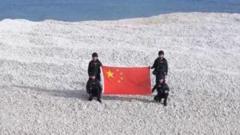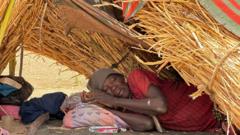Amid increasing friction with Washington, ANC National Chair Gwede Mantashe emphasized South Africa's sovereignty during a recent address. He firmly rejected calls from some citizens for U.S. intervention and affirmed that South Africa will not tolerate perceived threats to its autonomy.
Defending Sovereignty: South Africa’s ANC Responds to U.S. Tensions

Defending Sovereignty: South Africa’s ANC Responds to U.S. Tensions
As tensions between South Africa and the U.S. escalate over land laws and racial issues, ANC leaders assert their country's independence.
A senior member of South Africa's ruling ANC party has taken a decisive stance against perceived U.S. interference, reinforcing the nation’s sovereignty amid escalating tensions. Gwede Mantashe, the ANC National Chair, declared on Sunday, “We are not a province of the United States and that sovereignty will be defended.” His remarks come in response to criticisms from U.S. President Donald Trump regarding a new land expropriation law in South Africa. This law allows the government to seize land under specific circumstances without compensation, which Trump condemned in a February executive order, labeling it a potential threat to ethnic minority Afrikaners’ agricultural properties.
In light of these developments, South African President Cyril Ramaphosa defended the expropriation law, claiming it aims to ensure equitable land access for the public. Tensions have amplified further, as nearly 70,000 South Africans have sought asylum in the U.S. amid growing discontent. Mantashe expressed disapproval of South Africans who appealed to Trump for punitive measures against their home country, urging those advocating for asylum to reconsider their choices.
Comments on social media from Elon Musk, who criticized South Africa's ownership laws as “racist,” have added fuel to the fire. The past apartheid system left a legacy where white South Africans, who represent a minority, dominate land ownership. To alleviate ongoing diplomatic strife, South Africa has appointed a special envoy to Washington, Mcebisi Jonas, in an effort to enhance trade and diplomatic relations.
The situation has escalated further with the recent visit from officials of Orania, an all-white Afrikaner enclave, to the U.S. to negotiate for autonomous recognition. Mantashe noted an intention to promote integration within Orania, saying, “Black people must go and build there, and we mix them.” The emphasis on peace over hatred underscored his belief in collaborative nation-building in this divided landscape. As both nations navigate this complex chapter, the future of U.S.-South Africa relations remains uncertain.














